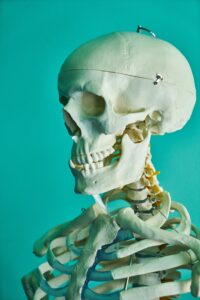Do you complain of jaw or ear pain, ear fullness, or headaches? If you do you may be dealing with TMJ (short for temporomandibular joint), which is a common term indicating a problem coming from the jaw. However, a better term for problems coming from this area is temporomandibular disorder (TMD). Not all problems are due to the joint alone, but can involve the muscles around the joint as well.
Anatomy Review:
To familiarize yourself with the anatomy, the temporomandibular joints (TMJ) are located just in front of each ear and join the jaw to the face. TMJ movement can be felt by placing your fingers just in front of your ear while opening and closing your mouth. Ligaments hold the 2 sides of the joint in place while several muscles move the jaw. In the joint itself there is a small disc that helps guide the jaw movement.
What’s Clenching Teeth:
Clenching or bruxism is when your top and bottom teeth are pressing against each other. The top and bottom teeth are not supposed to be touching at all. The only exception is when you are chewing food.
Symptoms of clenching:
Can clenching cause TMJ (TMD)? Yes.
Can clenching cause headaches? Yes.
Can clenching cause ear pain, fullness, and tinnitus? Yes.
In addition to this, clenching can cause TMJ locking and catching.
Reasons for clenching:
Clenching is a major habit to break as it is usually done when we are focused on something or are feeling stressed which leads to us tensing the muscles around our TMJs without realizing it. When focusing on something or while stressed some of us tense the neck and upper back muscles, while others tense their jaw muscles.
Is clenching your teeth bad?
Clenching is definitely bad as it causes excess wear on your teeth. To see if there are any signs of clenching take a look in a mirror to see if there is any flattening of your bottom front teeth. Clenching can also cause increased strain across your TMJs and muscles around the TMJs.
Treatment for clenching:
Botox for clenching – Botox is a newer treatment option that has had good results in relaxing the muscles of the face. Botox will therefore relax your muscles and cut the pain cycle, but if one continues to clench it may only be a temporary fix.
Mouthguard for clenching – Mouth guards or night guards are an effective strategy to protect the teeth if you clench at night. They will, however, not help you stop clenching.
How to stop clenching – A common cause for TMJ or TMD is habitual clenching. So, if one could stop clenching that would rectify the problem. While we cannot control ourselves while sleeping (therefore good to use a night guard) we can change our daily habits. We can actually reduce and sometimes stop our clenching altogether. We do this is by doing what we at North 49 Physical Therapy call the “Jaw Wiggle”. With the Jaw Wiggle we instruct those dealing with TMJ (or TMD) to do the following, every 20 minutes during the day:
- Lightly rest the tip of your tongue along the roof of your mouth.
- Gently wiggle the bottom jaw back and forth a small amount from side to side.
If the teeth are clenched the jaw will not wiggle back and forth. This will be a clue to relax the jaw until you can wiggle it. If you are not clenching the jaw will swing freely from side to side. As you do this, over time you will realize how much you are clenching and what your triggers are. Once you know your triggers you can make sure that when you are in the same situation that you consciously relax the jaw.
Other treatment options include eating a soft diet, avoiding gum, manual therapy (i.e. massage, joint mobilization), acupuncture, and the application of ice or heat. While these are useful strategies to reduce the strain on the TMJ and muscles around the TMJ they do not stop one from clenching.
What to do if I still have questions or ongoing problems?
If you have any questions regarding TMJ (TMD) and clenching, or are having ongoing problems with them please feel free to contact one of our physiotherapists at North 49 Physical Therapy who have specialized training in this area.
Our physiotherapists can be reached by phone at 1-306-343-7776, or you can book a Temporomandibular Assessment online 24/7 at www.north49therapy.ca.


